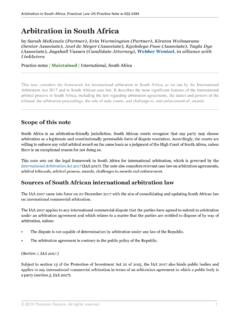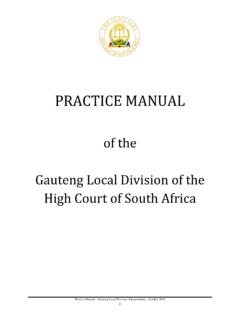Transcription of IN THE HIGH COURT OF SOUTH AFRICA (EASTERN CAPE …
1 1 IN THE HIGH COURT OF SOUTH AFRICA (EASTERN CAPE LOCAL DIVISION, MTHATHA) Case No:5435/17 REPORTABLE In the matter between: MXOLISI JOJWANA Applicant and THE REGIONAL COURT MAGISTRATE MR MENE First Respondent RNE HOLDINGS (PTY) LTD Second Respondent JUDGMENT TOKOTA J: 2 INTRODUCTORY BACKGROUND [1] The applicant in this matter instituted an action for recovery of damages against the second respondent before the regional magistrate, Mthatha. The details of that suit are not germane to the issue before this COURT . [2] After the pleadings were closed, and on 20 June 2017, the applicant applied to the registrar of the regional COURT for a trial date. The registrar allocated 1 November 2017 as the date of trial. On 10 August 2017 the applicant s attorneys duly served a notice on the second respondent s attorneys setting down the matter for hearing on 1 November 2017.
2 On 27 October 2017, three days before the hearing date, the applicant addressed a letter to the second respondent s attorneys in the following terms: We refer to this matter and to the summary of your expert in terms of Rule 24(9)(a) & (b). In the light of the fact that the expert can only be refuted by another expert evidence, we have taken receipt of report from our expert. Consequently the matter will not proceed on 01 November 2017. We shall furnish you with our expert summary very soon. 3 With regard to the photographs intended to be used during trial, we request colour copies thereof as some things are illegible in the photos. We trust that you will find the above in order. Yours faithfully A S ZONO & ASSOCIATES [3] The above quoted letter was delivered together with a notice purporting to remove the matter from the roll of cases set down for 1 November 2017.
3 On the same day (27 October 2017), the second respondent s attorneys addressed a letter to the applicant s attorneys in which they stated, inter alia, that the expert notice referred to in their letter had been delivered timeously, and insisted that the matter proceed on the hearing date. They stated that if the applicant was still persisting with the removal of the matter he would have to make a substantive application for postponement. [4] On 31 October 2017 once again the second respondent s attorneys addressed another email to the applicant s attorneys wherein it was pointed out that the notice of removal was irregular and that the 4 respondent would not agree to a postponement of the matter. It was pointed out further in that email that the notice did not address the question of costs to be occasioned by the purported removal.
4 It was persisted that a substantive application be filed, failing which the second respondent would attend COURT on the hearing date and apply for the dismissal of the claim. The relevant portion of the letter reads thus: Your notice is therefore irregular and the matter remains on the roll until the COURT has agreed that the matter either be removed or postponed as provided in Rule 31(1). We therefore reiterate that you should comply with the Rules by delivering a formal application for postponement and advance reasons for the request and more importantly tender our wasted costs herein, such costs to include preparation, the travel and accommodation of our expert witness, Counsel s fees at the bar council tariff on an attorney and client scale and to be taxable and payable immediately.
5 These letters were ignored. [5] On 1 November 2017 neither the applicant nor his attorney attended COURT . The second respondent s Counsel attended COURT and submitted that the claim be dismissed, alternatively, that the matter be struck from the roll with costs but the magistrate struck the matter from 5 the roll and ordered the applicant to pay costs including costs of employment of Counsel which costs were to be taxed immediately. THE PRESENT PROCEEDINGS. [6] On 17 November 2017 the applicant launched these proceedings seeking an order reviewing and setting aside the order of the magistrate. The magistrate has, quite properly in my view, elected to abide the decision of this COURT . The applicant contended that the magistrate committed an irregularity in striking the matter from the roll primarily on two grounds.
6 First, it was submitted that there is no provision in the magistrates Rules for the striking of the matter from the roll. For this reason, so it was argued, the magistrate exceeded his powers. Second, the magistrate breached the audi alteram partem rule by making an order of costs against the applicant in his absence. The applicant contended that a substantive application for a cost order should have been made so as to afford him an opportunity to oppose it. [7] Ms du Toit, who appeared for the second respondent, on the other hand, submitted that, first, the matter is not reviewable as the proceedings in the magistrate s COURT have not yet been finalised and 6 there are no exceptional circumstances justifying interference at this stage.
7 Second, the applicant was not entitled to unilaterally remove the matter from the roll. Consequently the removal was irregular and liable to be ignored. Therefore the magistrate committed no irregularity in striking the matter from the roll. IS THE MATTER REVIEWABLE? [8] It is by now well established that, generally, a High COURT will not, by way of entertaining an application for review, interfere with uncompleted proceedings in a lower It has been stated that a Superior COURT should be slow to intervene in unterminated proceedings in the COURT below, and should, generally speaking, confine the exercise of its powers to 'rare cases where grave injustice might otherwise result or where justice might not by other means be attained.
8 '2 1 Ismail and Others v Additional Magistrate, Wynberg and Another 1963 (1) SA 1 (A): at 5H - 6A; Wahlhaus and Others v Additional Magistrate, johannesburg and Another 1959 (3) SA 113 (A) at 119G,; Sita and Another v Olivier NO and Another 1967 (2) SA 442 (A) at 447E - F; Lombard en 'n Ander v Esterhuizen en 'n Ander 1993 (2) SACR 566 (W) at 569e - f; S v Western Areas Ltd and Others 2005 (5) SA 214 (SCA) (2005 (1) SACR 441) in para 20. 2 Wahlhous at 120 footnote 1 7 [9] Ms du Toit submitted that the civil action is still pending in the magistrate s COURT and there are no exceptional circumstances to justify interference at this stage. Accordingly, she submitted that this COURT should dismiss the review on this ground alone.
9 Mr Zono, for the applicant, on the other hand, submitted that the proceedings in the magistrate s COURT have been terminated. He submitted that the striking of the matter from the roll has had the effect of terminating the proceedings. In this regard he relied on the cases of Zuma v Democratic Alliance and Others 2018 (1) SA 200 (SCA) and Thint Holdings (Southern AFRICA ) (Pty) Ltd v National Director of Public Prosecutions; Zuma v NDPP 2009 (1) SA 141 (CC). In the latter case it was stated: [41] There are two obstacles in the way of this argument. First, once a case is struck from the roll, the case terminates and is no longer pending. There is no guarantee that the criminal proceedings will be reinstated. Removal of a matter from the roll is therefore abortive of the currency of the trial proceedings.
10 Should the trial ever be re-enrolled, it would start anew. [42] As soon as the criminal matter had been struck from the roll by Msimang J, therefore, the criminal proceedings were terminated and the proceedings were no longer pending. At the time, Mr Zuma had not yet 8 pleaded to the charge. Even if there might have been an intention on the part of the NDPP at that stage to reinstitute proceedings, there was no guarantee that he would actually do so. But it would not matter even if the probabilities were that he would do so. [10] In my view the above cases do not lay down a general rule that if a matter is struck from the roll it is thereby terminated and may not be re-enrolled. The striking of the matter from the roll has nothing to do with the merits of the case.















